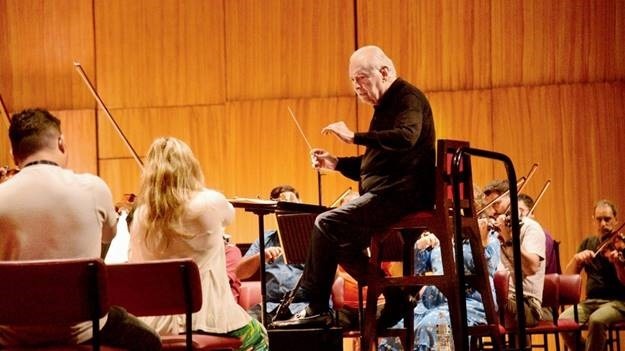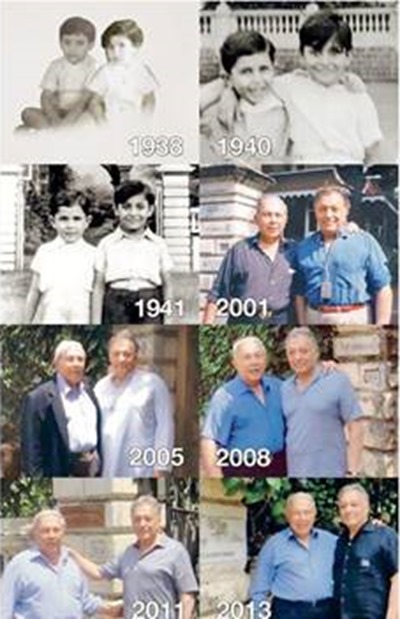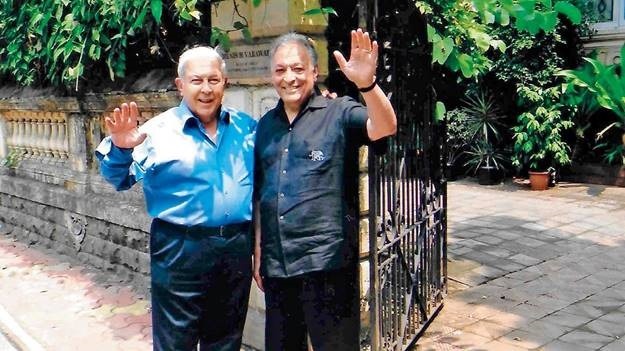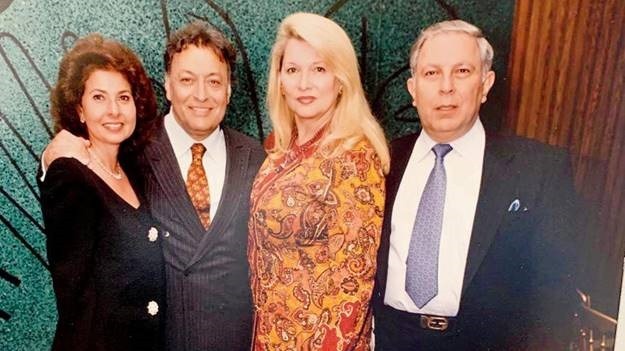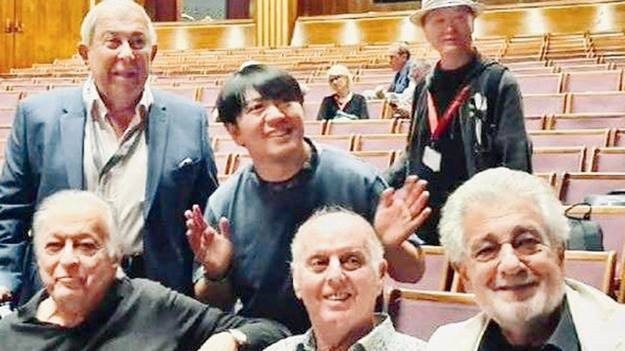A Western classical music colossus and a pioneer pharmaceutical chemist cherish their enduring friendship that spans concerts and continents
Maestro Zubin Mehta rehearsing with the Symphony Orchestra of India, ahead of the opening night concert this weekend at Jamshed Bhabha Theatre. Pic/Pradeep Dhivar
Few personalities require as little introduction. Globally feted icons, they are both the enduring pride of the country and reigning monarchs in their respective professions—Western classical music, and cutting-edge pharma research and manufacture. Maestro Zubin Mehta has been honoured with the Padma Vibhushan in 2001 and Dr Yusuf (Yuku) Hamied the Padma Bhushan in 2005.
Paired, they make the most celebrated childhood chums. Hitting if off from toddlerhood—the Mehtas at 21 Cuffe Parade (now Bagh-e-Abbas), down the road from the Hamieds of No. 25 (Indo Saracenic-Neo Gothic gem, Jassim House, later Taraporewala Mansion).
“Zubin today is exactly as he was, unassuming, sitting on the floor to eat dinner if he had to. Success hasn’t gone to his head,” declares Hamied.
In turn, the Conductor Emeritus of the Los Angeles Philharmonic and the Israel Philharmonic Orchestra admires Hamied’s contributions beyond steering Cipla (Chemical Industrial Pharmaceutical Laboratory). “He has saved several thousands of lives with no thought of profits. Making accessible drugs at affordable prices is an outstanding achievement,” says Mehta.
Yusuf Hamied and Zubin Mehta, from age 2 to 77, at the gate of 21-A Cuffe Parade
The living legends light up boyishly, encapsulating eight decades of friendship. Cricket remains a mutual love since school years. In an overseas phone call from Mehta, as Hamied offered his part of the interview at his Warden Road apartment (city home when not at his base in Spain) on a Sunday evening last November, the friends animatedly discussed Afridi’s predicament in the Pakistan-England T20 World Cup match. “We chat twice daily when cricket is on anywhere,” explained Hamied.
“What will I say that Yuku hasn’t already, he loves talking,” Mehta quips at the start of his conversation, after a rehearsal of monumental Mahler, Mozart and Schubert before the opening night at Jamshed Bhabha Theatre. A special first. After a lifetime of wielding baton magic over leading orchestras across the globe, the maestro is conducting the Symphony Orchestra of India (SOI) on home soil.
Zubin Mehta: I need to first say it feels wonderful here with the SOI. With no idea what to expect, I saw how prepared they are. Although we have rehearsed quite a lot, the initial standard is high. The soloists are particularly well picked. I’ve wanted to conduct this orchestra earlier. That didn’t happen because I visited the city often with foreign orchestras, through the Mehli Mehta Music Foundation. That space was created between other engagements. I couldn’t fit this in, I had thought. To come and conduct a Bombay orchestra would take so much time.
In 2013 at the same address. Pics Courtesy/Yusuf Hamied
Coming to the friendship. Life was slower, quieter, when Yuku and I were children. I went searching for my old Cuffe Parade home yesterday and was shocked, not able to locate it in the middle of everything dug and boarded. The condition is dreadful. I also had to guess which was Wodehouse Road, parallel to ours.
Dr Yusuf Hamied: Zubin and I make it a point to pose together regularly, a charming ritual every few years. Right from 1938, when we were two-year toddlers, through to 1940-41, 2001, 2005, 2008, 2011, 2013, 2015… At our same location: the 21-A gate. Amazing, isn’t it? How we came to No. 25 Cuffe Parade is a story I’ll never tire telling.
Returning from studies in Germany in 1928, my father rented a room in a Colaba side street. He and my mother walked down the promenade—present-day Cuffe Parade is reclaimed land—every night to take in the cool sea air. They would pass Jassim House, brightly lit, with posh cars parked in the driveway. Expected from the property’s prosperous Arab owner, dealing in Basra pearls. My father wistfully told mum, “It must be a dream to live in a house like that.” Suddenly one day, everything went quiet. With Mikimoto pearls gaining a foothold, the merchant went broke and sold the property. That was when my father rented 8,000 square feet there, for only a couple of hundred bucks a month. It is now a heritage building.
With the wives, Farida (left) and Nancy, in earlier years
ZM: My house faced the ocean, opposite Yuku’s were mangroves. Once, he dived into the water and half broke his head falling on a stone. A serious accident. Hearing about it, I immediately rushed over.
Our parents knew each other, but were not friends. His father was the millionaire in our midst. We gathered in excitement to see his first Cadillac being delivered. Later, my father bought a secondhand Oldsmobile. Look at the difference.
YH: Our home was an adda. Every Congress politician you think of has been to it. My father, Khwaja Abdul Hamied, won the elections in 1936-37 against Jinnah’s Muslim League candidate.
Strolling the old Cuffe Parade promenade in what was still a tranquil time, we met every evening and weekends. It was home from school at 4 pm, compound cricket, homework and dinner.
The friends in Salzburg in May this year, with legendary musicians Daniel Barenboim and Placido Domingo (seated front with Mehta), and Lang Lang beside Dr Hamied
ZM: I went to Campion and St Mary’s, Yuku the Cathedral School. NCPA Chairman Khushroo Suntook was at Campion with me, Ratan Tata with my brother Zarin two classes down. Yuku and I being cricket buffs, I rely on him for updates. In Los Angeles, where I live, you never know what goes on. The American papers report nothing on cricket. I drive my wife (former Hollywood actress Nancy Kovack) crazy, sitting up for 3 am matches owing to time conversions with Australia or Manchester.
YH: As kids, it was the Oval Maidan we went to when not batting or bowling in local compounds, breaking a few windows in the bargain. I remember clearly, at the age of 12, Zubin and I were engrossed in a cricket game at No. 21. That January day, a staff member from home ran up, saying, “Saab ne jaldi bulaya hai.” I bolted back, to hear news of Gandhiji’s assassination. We were glued to the radio to discover who was responsible. God forbid if it was a Muslim, there might be hell to pay. Like Gandhi and Maulana Azad, my father was strongly against the Partition.
I had a Lithuanian Jewish mother and Indian Muslim father, I have plenty of Hindu friends and Parsi besties like Zubin. What does that make me?
ZM: These questions barely arose during our schooldays. Aware we are of the same stock, Indian, nobody bothered about belonging to a certain faith or religion. No chance of intolerance. A secular institution, St Mary’s had Christians, Jews, Parsis, Hindus, Anglo-Indians, a cross-cultural mix of communities. Shia, Sunni, we knew no distinctions. As with the Parsis. We didn’t know a Shenshai from a Kadmi either.
Yuku’s father befriended political movement leaders, not mine (self-taught violinist Mehli Mehta, founder-conductor of the Bombay Symphony Orchestra). I knew colleagues of my father whom he conducted, in sections of the orchestra, at practices in our house. I recall him narrating how, on the stage of the Taj Hotel where he played, two Italians supporting different political parties, one fascist and one liberal, wouldn’t stop fighting in Italian. The pianist Pagliarin and cellist Verga.
My father himself was extremely against British rule. That feeling grew and grew because he unfortunately had to perform where Indians weren’t allowed, like the Yacht and Breach Candy clubs, and even given his meals backstage. He suffered the insults, got home grumbling. Naturally, he was very pleased taking my brother and me to Apollo Bunder when Nehru said goodbye to Mountbatten. Whenever we spotted a British army officer go by, we shouted “Quit India!” In cinema halls we walked out when the British anthem played.
YH: We were inseparable till about age 12. We are all products of our environment. My father founded Cipla, one of the country’s oldest generic pharmaceutical companies, in the mid-1930s. Following in his father’s steps, Zubin’s was an unavoidable musical legacy.
ZM: My mother wanted me to be a doctor. You’ve mentioned her, I recollect, in your Bombay book (Once Upon a City) which I have. A chapter on Gowalia Tank described me visiting my grandparents in Hardinge House.
Anyway, I went to St Xavier’s College for two semesters, supposedly pre-med. I never entered medical college. I went to Vienna instead, already wrapped deep in the recordings familiar by ear, growing up with my father’s music of beautiful standard.
I was 19 when the Vienna Academy students played for refugees at the Austrian-Hungarian border during the 1956 Hungarian Revolution. At the end of the concert, a Hungarian priest blessed us. Without understanding his words, I appreciated them. And they have stayed with me. Another performance I cannot forget is the Bavarian State Orchestra in Kashmir. The local musicians braved death threats. Yet they all turned up for Hindus and Muslims
sitting together.
YH: After Elphinstone College, in 1953, I headed to Cambridge. From 1954, when he left for Vienna and I did for Cambridge, we had absolutely zero contact for the next thirteen years.
In the 1960s, my hardest years because of the pharma scene dominated by MNCs, Zubin shot to fame. After huge critical acclaim abroad, he came back in 1967. Friends gathered at the airport to welcome him. I didn’t. My sense was that thirteen years, 1954 to 1967, is a long spell. What if he had changed? With him being so widely known, would I not merely add to the crowd? That same evening my phone rang at home. It was Zubin, asking, “Every friend except you. Why?” My wife Farida (daughter of popular filmmaker AR Kardar) and I went over to him at the Rajput suite of the Taj. It was superb, as if no intervening years had elapsed.
Thereafter, we’ve attended concerts wherever in the world he happens to be. Admittedly, I am no passionate classical music lover. Being with Zubin and our pianist-conductor friend, Daniel Barenboim, I’ve learnt to develop a liking for it.
ZM: I’m really not sure how much he actually enjoys. He and Farida came for Tristan and Isolde in Vienna, an almost five-hour opera. They didn’t realise how long it was going to be. After that he has come for many other performances and mine for sure. It’s easier for him to tap into my professional sphere than the other way about. Pharmaceutical research is extremely niche.
YH: It’s splendid watching the way Zubin greets others connected to my field of healthcare. I routinely fix important calendar dates months ahead, coordinating my business trips to match his itinerary of shows. We try to chart out where to meet, taking care to consider certain regular occasions of interest to us, like sports events at Wimbledon or Lord’s.
ZM: He knows exactly every day what I’m doing. He has my schedule, but I don’t have his. My life is planned at least three years in advance.
Similar in temperament, our wives, Nancy and Farida, are equally close. I used to have plenty of relatives in Bombay, most have passed away. I hope their families come to my concerts.
YH: He warmly introduces me to people as “My friend the industry leader,” at formally hosted dinners where I’m next to him. He has a fantastic memory for names, faces, places and his work of course. Notice at the podium, there’s no written score before him.
Like Farida and I, Nancy and Zubin have no children. Zubin has two from his previous marriage and grandchildren. Despite madly hectic schedules, he’s a big family man, managing to spend time connecting with extended family and friends. We have celebrated landmark birthdays together, our 50th, 60th, 70th, 75th, 80th… and been beside each other for awards and honours we are privileged to receive. I attend his major functions. We are compatible souls. Never quarrel, never argue.
ZM: Daniel Barenboim says the same. That after all these years, he and I have never had an argument. When we discuss music, we don’t always agree. Yuku and I are great friends with Daniel through me. He has financially helped Daniel’s Berlin school, the Barenboim-Said Academy, dedicated to Israelis and Palestinians in education and peace.
YH: I hold all relationships to be meaningful. What Zubin and I have is an exceptional, one-of-a-kind bond.
Author-publisher Meher Marfatia writes monthly on city friendships. You can reach her at meher.marfatia@mid-day.com/www.meher marfatia.com

